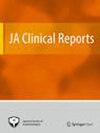Association between preoperative frailty and surgical Apgar score in abdominal cancer surgery: a secondary analysis of a prospective observational study
IF 1
Q3 ANESTHESIOLOGY
引用次数: 0
Abstract
The surgical Apgar score is useful for predicting postoperative morbidity and mortality. However, its applicability in frail patients with minimal hemodynamic variation remains unknown. This study aimed to investigate the association between frailty and surgical Apgar score. This secondary analysis included 210 patients ≥ 65 years of age undergoing elective major abdominal surgery for cancer. Frailty was assessed using the Fried Frailty Phenotype Questionnaire and defined as a total score of ≥ 3. The surgical Apgar score (range, 0−10; including mean blood pressure, heart rate, and blood loss volume) was compared between patients with or without frailty using the Mann–Whitney U test. Postoperative severe complications and length of postoperative stay were compared between patients with surgical Apgar scores ≤ 7 and > 7. Among the included patients, 45 were classified as frail. The median [1st quartile, 3rd quartile] surgical Apgar scores in patients with and without frailty were 7.0 [7.0, 8.0] and 8.0 [7.0, 8.0], respectively (P = 0.03). Patients with surgical Apgar score ≤7 had a higher incidence of serious postoperative complications (P = 0.03) and longer hospital stays (P < 0.001) compared with patients with surgical Apgar score >7. Frail patients have lower SAS, and patients with lower SAS have higher postoperative complication rates and longer hospital stays in patients who underwent cancer surgery.腹部癌症手术中术前虚弱程度与手术阿普加评分之间的关系:一项前瞻性观察研究的二次分析
手术阿普加评分可用于预测术后发病率和死亡率。然而,它是否适用于血流动力学变化极小的虚弱患者仍是未知数。本研究旨在调查体弱与手术阿普加评分之间的关系。这项二次分析包括210名年龄≥65岁、因癌症接受择期腹部大手术的患者。虚弱程度使用弗里德虚弱表型问卷进行评估,总分≥3分即为虚弱。使用 Mann-Whitney U 检验比较了有无虚弱的患者的手术 Apgar 评分(范围为 0-10;包括平均血压、心率和失血量)。对手术阿普加评分≤7分和大于7分的患者的术后严重并发症和术后住院时间进行了比较。体弱和非体弱患者的手术Apgar评分中位数[第一四分位数、第三四分位数]分别为7.0 [7.0, 8.0]和8.0 [7.0, 8.0](P = 0.03)。与手术Apgar评分>7分的患者相比,手术Apgar评分≤7分的患者术后严重并发症发生率更高(P = 0.03),住院时间更长(P < 0.001)。 在接受癌症手术的患者中,体弱患者的SAS较低,SAS较低的患者术后并发症发生率较高,住院时间较长。
本文章由计算机程序翻译,如有差异,请以英文原文为准。
求助全文
约1分钟内获得全文
求助全文
来源期刊

JA Clinical Reports
ANESTHESIOLOGY-
CiteScore
1.30
自引率
0.00%
发文量
90
审稿时长
9 weeks
期刊介绍:
JA Clinical Reports is a companion journal to the Journal of Anesthesia (JA), the official journal of the Japanese Society of Anesthesiologists (JSA). This journal is an open access, peer-reviewed, online journal related to clinical anesthesia practices such as anesthesia management, pain management and intensive care. Case reports are very important articles from the viewpoint of education and the cultivation of scientific thinking in the field of anesthesia. However, submissions of anesthesia research and clinical reports from Japan are notably decreasing in major anesthesia journals. Therefore, the JSA has decided to launch a new journal, JA Clinical Reports, to encourage JSA members, particularly junior Japanese anesthesiologists, to publish papers in English language.
 求助内容:
求助内容: 应助结果提醒方式:
应助结果提醒方式:


